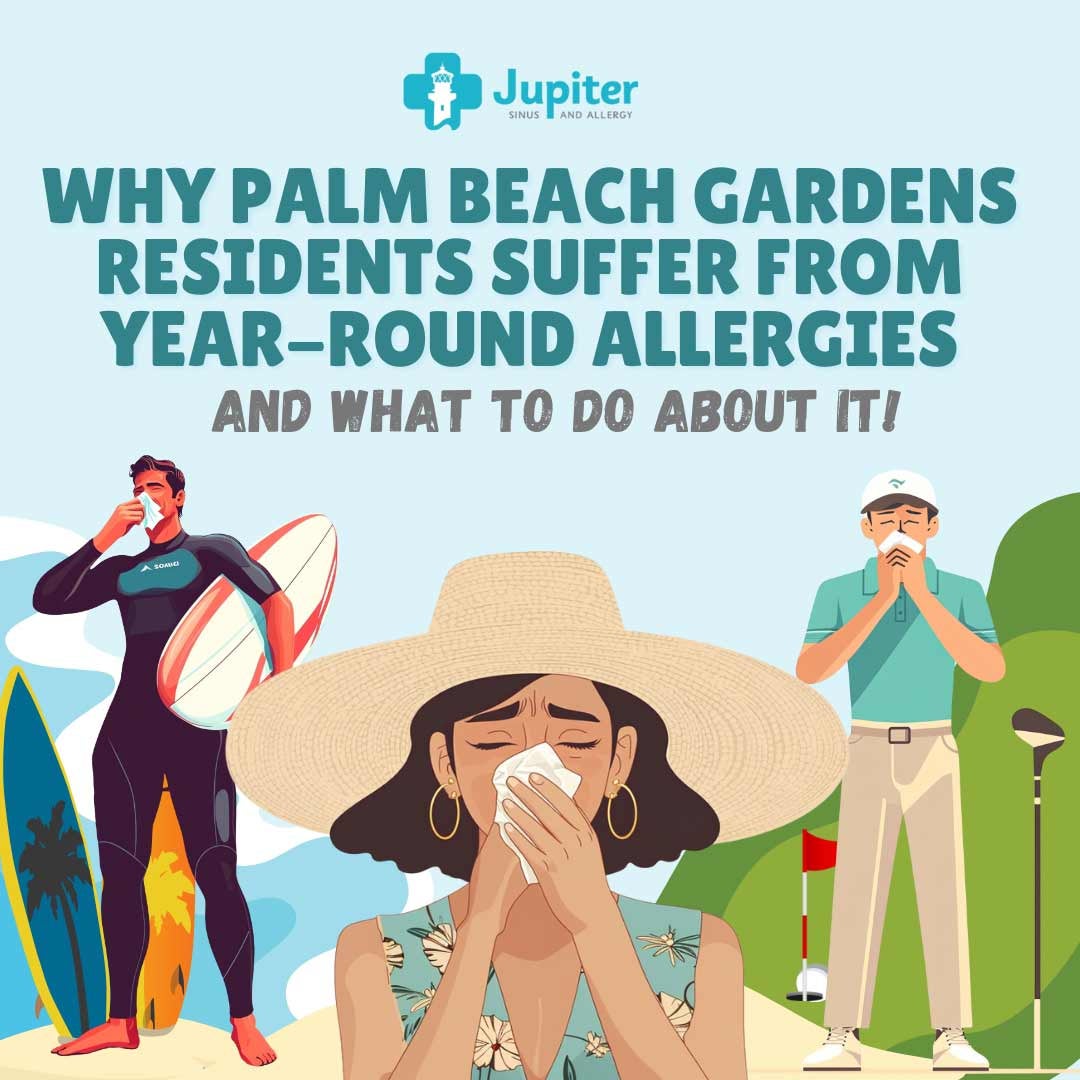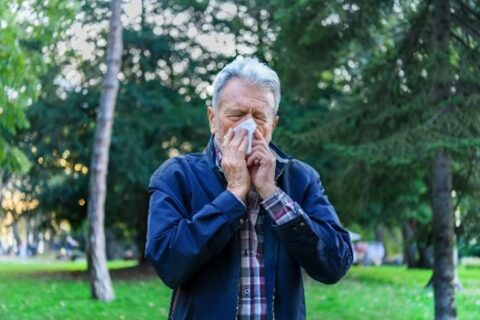Dealing with Year-Round Allergies in Palm Beach Gardens
The city of Palm Beach Gardens is a favorite tourist destination for many visitors throughout the year. Its residents and visitors all over the country can’t help but fall in love with its sunny weather and warm temperatures. While it’s perfect for outdoor activities, it can trigger seasonal allergies in many people.

The Common Allergens in Florida
Florida’s warm, humid climate and year-round sunshine make it a paradise for plants—and a hotspot for allergies. The state’s diverse vegetation releases a variety of allergens that can trigger symptoms in both residents and visitors. Let’s take a look at some of the most common culprits behind Florida allergies:
- Trees: Florida residents need to be mindful of pollen-releasing trees, including cedar, cypress, cottonwood, elm, juniper, maple, oak, mulberry, olive, and palm trees.
- Grass: Due to the state’s warm and sunny days, it is home to diverse plant species that release allergy-inducing pollen. Timothy, Bahia, Bermuda, fescue, johnson, red top, salt grass, and blue grasses are common throughout the state.
- Weeds: Ragweed, cockleweed, russian thistle, and sweet vernal commonly grow around Florida. They release pollen throughout the year and can cause year-round allergies.
- Dust mites: Dust mite allergies are common in Florida, including the city of Palm Beach Gardens. Dust mites thrive in warm and humid conditions, which the state is known for.
- Mold spores: The city’s mild and humid weather conditions make it the ideal environment for mold to grow. These particles are airborne, and when inhaled, can cause allergic reactions.
Why Palm Beach Gardens Suffer From Year-Round Allergies
High pollen counts
Palm Beach Gardens boasts a warm and sunny climate throughout the year. It’s one of the main reasons why so many people move here and why others flock from northern parts of the country to visit it. While this is good news for those who enjoy outdoor activities under the sun, it’s not the best news for allergy sufferers.
Thanks to Florida’s warm, humid climate, the city—and the state as a whole—supports a wide variety of plants and trees, which means an extended pollen season. For many residents, pollen allergies are a familiar struggle, as weeds, grasses, and trees release pollen that often triggers frustrating allergy symptoms.
Ocean breezes
Palm Beach Gardens is located minutes away from Florida’s beautiful beaches. Its proximity to the ocean can sometimes bring relief to allergy sufferers as the breeze helps clear out pollen from the air. However, the sea breeze can sometimes blow inland instead. On these days, pollen levels can rise and allergens can travel for miles in the air. When inhaled, these can trigger an array of allergy symptoms.
Golf course landscapes
Crowned as Florida’s Golf Capital, Palm Beach is home to several golf courses. Its sunny weather and warm climate also make it a top destination for golfers. There are various allergens on golf courses, including pollen, grass, weeds, and trees. These allergens not only impact the players but also residents who reside near these golf course landscapes. As we all know, pollen allergens can travel in the air and, depending on the air, can reach even those far away. This can trigger allergies for many players and residents alike.
Suffer No More: Manage and Treat Your Allergies
While you can’t avoid allergy triggers, you can take several measures to prepare for allergy season and allergy management:
- Keep an eye on pollen forecasts: Tools like The Weather Channel, pollen.com, and AccuWeather allow residents to keep track of pollen levels in their area. Make sure to check them before planning out your day.
- Take allergy medications: Start taking your allergy medications before allergy season starts. This helps your immune system build up protection against allergens.
- Stay indoors: Try to stay indoors on days with high pollen.
- Clean and vacuum regularly: Clean and vacuum your home regularly to reduce pollen, allergens, dust mites, and pet dander.
- Keep doors and windows closed: During peak pollen season, keep your doors and windows closed to prevent outdoor allergens from infiltrating your home.
- Use an air purifier: Use an air purifier with a HEPA filter to reduce and filter out indoor allergens.
- Wash everything: Wash outdoor clothes and bedding regularly. Don’t forget to shower from head to toe once you get home.
- Allergy testing: Each individual has a unique allergy profile. Get tested at Jupiter Sinus and Allergy and understand your allergies better.
Immunotherapy treatment options: We offer immunotherapy options to not only manage your allergies but also address them at the root cause. At Jupiter Sinus and Allergy, we give you the choice between allergy shots and allergy drops. Both offer long-term relief and better allergy management. Schedule a consultation with our team today and decide what works best for you.
This blog is for informational purposes only and should not be considered medical advice. Always consult a licensed healthcare professional regarding any medical condition or treatment.
The information provided in this article is for informational and educational purposes only and does not constitute medical advice. It is not intended to diagnose, treat, cure, or prevent any disease or medical condition. Always seek the guidance of your physician or other qualified healthcare provider with any questions you may have regarding a medical condition or treatment.
Results may vary: Treatment outcomes and health experiences may differ based on individual medical history, condition severity, and response to care.
Emergency Notice: If you are experiencing a medical emergency, call 911 or seek immediate medical attention.


